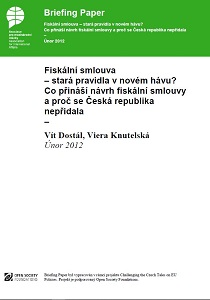Fiskální smlouva – stará pravidla v novém hávu? Co přináší návrh fiskální smlouvy a proč se Česká republika nepřidala
Fiscal treaty – old rules in a new guise? What does the draft fiscal agreement bring and why the Czech Republic did not join
Author(s): Vít Dostál, Viera Knutelská
Subject(s): Economic policy, Financial Markets, Public Finances
Published by: AMO – Asociace pro mezinárodní otázky
Summary/Abstract: The second briefing paper prepared as part of the Challenging the Czech Tales on European Policies project focuses on the Treaty on Stability, Coordination and Governance in the Economic and Monetary Union, i.e. the so-called fiscal contract. The aim of the text is to compare the proposed amendments with the already existing rules introduced by secondary legislation and to evaluate the arguments according to which the Czech Republic decided not to accede to the fiscal treaty at the last meeting of the European Council. In September 2010, the European Commission proposed a package of six economic governance reform acts, the so-called six-pack. These acts were finally approved in November 2011 and entered into force in December. The package, which includes the reform of the Growth and Stability Pact, introduces the European Semester and new options for sanctions for breaching budgetary commitments, was aimed at strengthening the previously "toothless" provisions of the Stability and Growth Pact so that member states are forced to comply with the provisions on maximum budget deficits and public debts.
Series: Association for International Affairs - Briefing Papers
- Page Count: 9
- Publication Year: 2012
- Language: Czech
- Content File-PDF

